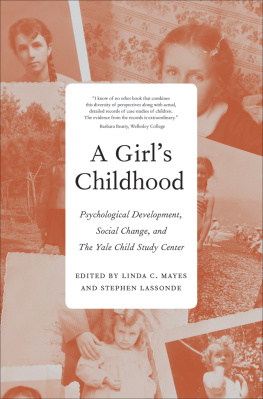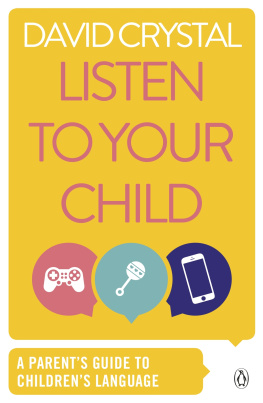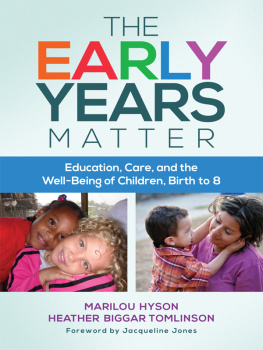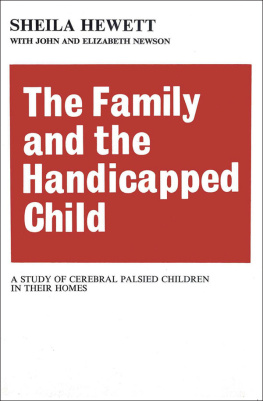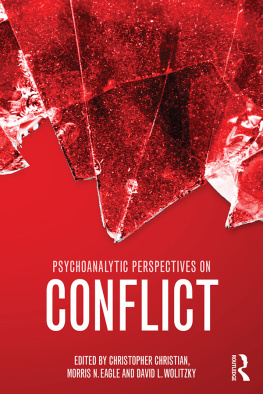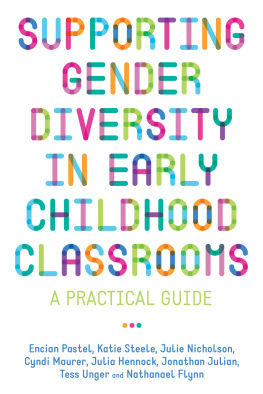A GIRLS CHILDHOOD
A Girls Childhood
Psychological Development, Social Change, and The Yale Child Study Center
Edited by LINDA C. MAYES & STEPHEN LASSONDE
Foreword by DEBORAH WEINSTEIN
Yale UNIVERSITY PRESS
NEW HAVEN & LONDON
Published with assistance from the foundation established in memory of Calvin Chapin of the Class of 1788, Yale College.
Copyright 2014 by Yale University.
All rights reserved.
This book may not be reproduced, in whole or in part, including illustrations, in any form (beyond that copying permitted by Sections 107 and 108 of the U.S. Copyright Law and except by reviewers for the public press), without written permission from the publishers.
Yale University Press books may be purchased in quantity for educational, business, or promotional use. For information, please e-mail (U.K. office).
Designed by Mary Valencia.
Set in Minion and Fournier MT types by Newgen North America.
Printed in the United States of America.
Library of Congress Cataloging-in-Publication Data
A girls childhood: psychological development, social change, and The Yale Child Study Center / edited by Linda C. Mayes and Stephen Lassonde ; foreword by Deborah Weinstein.
pages cm
Includes bibliographical references and index.
ISBN 978-0-300-11759-2 (cloth: alk. paper)
1. Child developmentUnited StatesLongitudinal studies. 2. ChildrenUnited StatesLongitudinal studies. 3. Parent and childUnited StatesLongitudinal studies. I. Mayes, Linda C. II. Lassonde, Stephen.
HQ792.U5L664 2014
305.231dc23
2014005822
A catalogue record for this book is available from the British Library.
This paper meets the requirements of ANSI/NISO Z39.481992 (Permanence of Paper).
10 9 8 7 6 5 4 3 2 1
To Bill Kessen, Marion Mayes, Alex Lassonde, and Jonathan Lassonde
FOREWORD
DEBORAH WEINSTEIN
In the introduction to the edited volume Biographies of Scientific Objects, historian of science Lorraine Daston juxtaposes the solid, obvious, sharply outlined, in-the-way things of quotidian experience with the elusive and hard-won status of scientific objects. In contrast to everyday objects that require neither effort nor ingenuity nor instruments for their detection, scientific objects require significant effort to be recognized as such and rendered observable, measurable, and/or subject to experimentation. As Daston and the other contributors to Biographies of Scientific Objects contend, phenomena as diverse as dreams, atoms, monsters, economic value, and the self had a reality prior to becoming the target of scientific investigation, but there is a historicity to their status as scientific objects per se, and scientific attention has affected them in important ways.
One might similarly consider the biography of child development as a scientific object that came into being during the twentieth century. A biographical heuristic is particularly suggestive for framing one mid-century psychoanalytically informed study of child development, the Yale Longitudinal Study (YLS), whose archive has provided the inspiration for this book. The YLS bore the traces of its genesis and implementation in a moment of scientific optimism and changing views of childhood (as the chapters that follow amply demonstrate), and its records are an astonishing set of materials for scholars interested in any of the many dimensions of postwar American life that informed the project. In the psychic life and childhood experiences of Evelyn, the young girl whose analysis is at the heart of this book, we can see crucial dimensions of postwar American history. Beyond the life story of any individual person, the biography of the YLS as an interdisciplinary research project contributed to the biography of child development as a scientific object.
Scientific studies of child development had roots in the first half of the twentieth century. The early twentieth-century efforts of child guidance professionals, mental hygienists, child welfare advocates, and child psychologists, such as Arnold Gesell, established the child as a legitimate subject of psychological research.
The postWorld War II proliferation of interdisciplinary child study research, including the YLS, and the emergence of child psychiatry as a discipline, were crucial to the subsequent fortunes of child development as an object of scientific investigation, as was the consolidation of the developmental paradigm characterized by Linda Mayes and Stephen Lassonde in their introduction to this volume. Several dimensions of mid-century American life contributed to shaping the contours and salience of the Yale project and child development studies more generally.
One dimension of postwar America, the growth of psychology and psychoanalysis during the 1940s and 1950s, itself had multiple facets. The number of psychologically oriented clinicians, including clinical psychologists, psychiatric social workers, and professionals in the new field of child psychiatry, grew sharply after World War II. Psychiatrists in general increasingly advocated their mission of promoting the mental health of the general population, not just treating mental illness among institutionalized patients. Psychoanalysis was well suited to this framing of psychiatry, given its interest in the unconscious drives and instincts of all people. Buoyed by their perceived success treating psychoneurotic casualties among soldiers during World War II, psychoanalytic psychiatrists such as William Menninger became influential leaders in their profession. Furthermore, the passage of the National Mental Health Act in 1946 and the ensuing establishment of the National Institute of Mental Health in 1949 were significant both for institutionalizing federal support for psychologically oriented research and clinical care and for their designated names highlighting mental health rather than neuropsychiatric disorders, a choice that was emblematic of psychiatrys postwar emphasis on normalization.
The influence of psychoanalysis went beyond the realms of the clinic or popular culture, infusing many of the intellectual currents of the 1950s. In the social sciences, prominent scholars such as the sociologist Talcott
The psychologization of parenting and child rearing echoed the turn to psychoanalysis and psychology in the social sciences. Postwar views of motherhood increasingly framed the importance of upbringing in terms of the psychological formation of future democratic citizens. The common thread through these diverse postwar views of motherhood and child rearing was the shared psychoanalytic attention to the role of the family in shaping the link between personality and society, psyche and politics.
Psychoanalytic interest in mother-child interactions was particularly relevant for child development research. The work of John Bowlby and Anna Freud, among others, contributed to intensified postwar interest in the mother-child dyad among British and American psychoanalysts. The wartime observations by Anna Freud and Dorothy Burlingham of British children living at the Hampstead Nurseries while separated from their families during the Blitz underscored the importance of childrens attachment to their mothers for healthy psychological development. Historian Eli Zaretsky has argued that, in the United States, the psychoanalytic mother-child paradigm was filtered through American ego psychology, in which it tended to devolve into a straightforward developmental psychology rather than address drives, self-reflection, or other Freudian concerns. Such studies tended to reinscribe traditional gender roles for mothers as well as their children. They also underscored the dynamic relationship between the pathological and the normal since investigations of detrimental environmental conditions and poor psychological outcomes were used to formulate theories of normal childhood development and prescribe normative childrearing practices.
Next page
